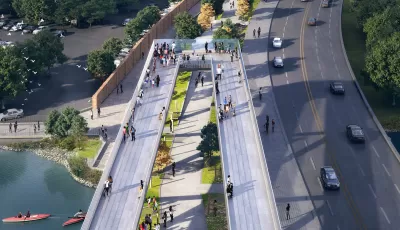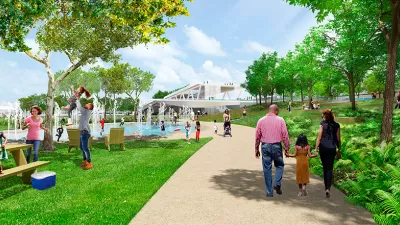Project leaders working on the 11th Street Bridge Park hope to prevent displacement of residents and bring economic and social benefits to the surrounding community.

Planners for a new park in Washington, D.C. want to avoid the pitfalls encountered during the development of New York City’s High Line, writes Cari Shane in Fast Company.
The 11th Street Bridge Park, first proposed a decade ago, will transform a defunct bridge into a pedestrian-only park that will connect the two sides of the Anacostia River. Scott Kratz, head of the 11th Street Bridge Park project, says he and his team want to avoid the “eco-gentrification” that drove up housing costs and displaced residents near the High Line.
“One of the most important ideas behind the project was to make sure that the Black community east of the river benefited from the added value that the park would bring,” such as programs that help renters become homeowners and small business owners buy their properties. According to the article, “In total, $86 million has been invested on the equitable development side of the bridge park project. That includes $14 million in charitable donations raised by the bridge park and an investment of $72 million from the Local Initiatives Support Corporation, a federally certified nonprofit that serves low-income communities throughout the U.S.”
The article details the plan for the park, designed by Dutch firm OMA and U.S.-based landscape architecture studio Olin. Construction is expected to begin in early 2024.
FULL STORY: How D.C.’s version of the High Line aims to avoid New York’s mistakes

Planetizen Federal Action Tracker
A weekly monitor of how Trump’s orders and actions are impacting planners and planning in America.

Congressman Proposes Bill to Rename DC Metro “Trump Train”
The Make Autorail Great Again Act would withhold federal funding to the system until the Washington Metropolitan Area Transit Authority (WMATA), rebrands as the Washington Metropolitan Authority for Greater Access (WMAGA).

The Simple Legislative Tool Transforming Vacant Downtowns
In California, Michigan and Georgia, an easy win is bringing dollars — and delight — back to city centers.

In These Cities, Most New Housing is Under 441 Square Feet
With loosened restrictions on “micro-housing,” tiny units now make up as much as 66% of newly constructed housing.

Albuquerque’s Microtransit: A Planner’s Answer to Food Access Gaps
New microtransit vans in Albuquerque aim to close food access gaps by linking low-income areas to grocery stores, cutting travel times by 30 percent and offering planners a scalable model for equity-focused transit.

This City Will Pay You to Meet Your Neighbors
A North Kansas City grant program offers up to $400 for residents to throw neighborhood block parties.
Urban Design for Planners 1: Software Tools
This six-course series explores essential urban design concepts using open source software and equips planners with the tools they need to participate fully in the urban design process.
Planning for Universal Design
Learn the tools for implementing Universal Design in planning regulations.
Smith Gee Studio
City of Charlotte
City of Camden Redevelopment Agency
City of Astoria
Transportation Research & Education Center (TREC) at Portland State University
US High Speed Rail Association
City of Camden Redevelopment Agency
Municipality of Princeton (NJ)




























